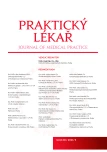Nutrition as a complementary form of psoriasis treatment
Authors:
S. Mrosková 1; V. Konečná 2
Authors‘ workplace:
Prešovská univerzita v Prešove Fakulta zdravotníckych odborov Katedra ošetrovateľstva Vedúci: Dr. h. c. prof. PhDr. Anna Eliášová, PhD., DBA
1; Fakultná nemocnica J. A. Reimana v Prešove Oddelenie dermatovenerológie Vedúci: MUDr. Katarína Melníková, MBA
2
Published in:
Prakt. Lék. 2018; 98(5): 214-216
Category:
Of different specialties
Overview
Psoriasis vulgaris is one of the most common skin, chronic, immune-related diseases. It affects about 0.5–11% of the adult population. The treatment integrates local and systemic therapy, in cases of moderate to severe psoriasis, biologic therapy is used. The modification of eating habits or using nutritional supplements in patients with psoriasis or psoriatic arthritis has been an observed area for several decades. Patients with this skin disease, especially after their initial diagnosis, want to know whether changing diets can contribute to improving their health problems. The article briefly summarizes the most recent findings on the impact of selected nutrition areas – gluten-free diet, hypocaloric diet, nutritional supplements, alcohol – on the incidence of psoriasis, the severity of skin changes or the quality of life. Changing diet in certain groups of patients with psoriasis has beneficial effects, but nutritional interventions should always be seen as an additional form of treatment along with the standardized treatment of psoriasis.
KEYWORDS:
psoriasis – gluten-free diet – hypocaloric diet – alcohol – dietary supplements
Sources
1. Afifi L, Danesh MJ, Lee KM, et al. Dietary behaviors in psoriasis: patient-reported outcomes from a U.S. national survey. Dermatol Ther (Heidelb) 2017; 7(2): 227–242.
2. Bhatia BK, Millsop JW, Debbaneh M, et al. Diet and psoriasis, part II: celiac disease and role of a gluten-free diet. J Am Acad Dermatol 2014; 71(2): 350–358.
3. Debbaneh M, Millsop JW, Bhatia BK, et al. Diet and psoriasis, part I: Impact of weight loss interventions. J Am Acad Dermatol 2014; 71(1): 133–140.
4. Drlík L. Možnosti terapie těžkých forem psoriázy. Dermatol Praxi 2015; 9(4): 152–156.
5. Ford AR, Siegel M, Bagel J, et al. Dietary recommendations for adults with psoriasis or psoriatic arthritis from the medical board of the National Psoriasis Foundation: a systematic review. JAMA Dermatol. doi: 10.1001/jamadermatol.2018.1412 [Epub ahead of print].
6. del Giglio M, Gisondi P, Tessari G, Girolomoni G. Weight reduction alone may not be sufficient to maintain disease remission in obese patients with psoriasis: a randomized, investigator-blinded study. Dermatology 2012; 224(1): 31–37.
7. Gkalpakiotis S. Komorbidity psoriázy. Čas. Lék. čes. 2017; 156 : 119–122.
8. Gkalpakiotis S, Arenberger P, Adenubiová E. Psychosociální aspekty života pacientů s psoriázou v České republice. Čas. Lék. čes. 2013; 4 : 189–196.
9. Michaëlsson G, Ahs S, Hammarström I, et al. Gluten-free diet in psoriasis patients with antibodies to gliadin results in decreased expression of tissue transglutaminase and fewer Ki67+ cells in the dermis. Acta Derm Venereol 2003; 83(6): 425–429.
10. Millsop JW, Bhatia BK, Debbaneh M, et al. Diet and psoriasis, part III: role of nutritional supplements. J Am Acad Dermatol 2014; 71(3): 561–569.
11. di Minno MN, Peluso R, Iervolino S, et al. Weight loss and achievement of minimal disease activity in patients with psoriatic arthritis starting treatment with tumour necrosis factor α blockers. Ann Rheum Dis 2014; 73(6): 1157–1162.
12. Mourek J. Omega-3 mastné kyseliny, přehled účinků a jejich interpretace. Praha: Triton 2007.
13. Murzaku EC, Bronsnick T, Bronsnick T, Rao BK. Diet in dermatology. Part II. Melanoma, chronic urticaria, and psoriasis. J Am Acad Dermatol 2014; 71(6): 1053.e1–1053.e16.
14. Warren RB, Brown BC, Lavery D, et al. Biologic therapies for psoriasis: practical experience in a U.K. tertiary referral centre. Br J Dermatol 2009; 160(1): 162–169.
15. WHO. Global report on Psoriasis. 2016 [online]. Dostupné z: http://www.who.int/iris/handle/10665/204417 [cit. 2018-07-17].
16. Wu JJ, Nguyen TU, Poon KY, Herrinton LJ. The association of psoriasis with autoimmune diseases. J Am Acad Dermatol 2012; 67(5): 924–930.
Labels
General practitioner for children and adolescents General practitioner for adultsArticle was published in
General Practitioner

2018 Issue 5
- Advances in the Treatment of Myasthenia Gravis on the Horizon
- Hope Awakens with Early Diagnosis of Parkinson's Disease Based on Skin Odor
- Memantine in Dementia Therapy – Current Findings and Possible Future Applications
- Memantine Eases Daily Life for Patients and Caregivers
- Possibilities of Using Metamizole in the Treatment of Acute Primary Headaches
-
All articles in this issue
- Antibiotics resistance and importance of the horizontal transmission of genetic information
- Therapy of MODY in general practitioner’s surgery
- Dry form of age related macular degeneration and nutritional supplements, use of microperimetry
- Physical activity in seniors 65+ and its context with health literacy
- Nutrition as a complementary form of psoriasis treatment
- Flu from a general practitioner’s point of view – case report
- General Practitioner
- Journal archive
- Current issue
- About the journal
Most read in this issue
- Flu from a general practitioner’s point of view – case report
- Physical activity in seniors 65+ and its context with health literacy
- Dry form of age related macular degeneration and nutritional supplements, use of microperimetry
- Antibiotics resistance and importance of the horizontal transmission of genetic information
